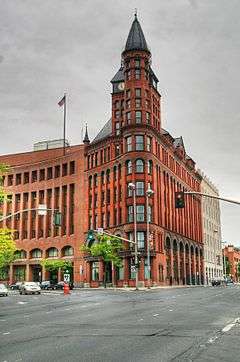The Spokesman-Review
|
| |
|
The July 27, 2005 front page of The Spokesman-Review | |
| Type | Daily newspaper |
|---|---|
| Format | Broadsheet |
| Owner(s) | Cowles Company |
| Publisher | William Stacey Cowles |
| Editor | Gary Graham[1] |
| Founded | 1894 |
| Language | English |
| Headquarters |
999 West Riverside Avenue Spokane, WA 99201 United States |
| Circulation | Daily: 76,291. Sunday: 95,939. |
| OCLC number | 11102529 |
| Website | spokesman.com |
The Spokesman-Review is a daily broadsheet newspaper based in Spokane, Washington, where it is the city's only daily publication. It has the third highest readership among daily newspapers in Washington, with most of its readership base in Eastern Washington.
History
The Spokesman-Review was formed from the merger of the Spokane Falls Review (1883–1894) and the Spokesman (1890–1893) in 1893 and first published under the present name on June 29, 1894.[2][3] It later absorbed the competing afternoon paper, the Spokane Chronicle. The newspaper formerly published three editions, a metro edition covering Spokane and the outlying areas, a Spokane Valley edition and an Idaho edition covering northern Idaho. After a large downsizing of the newsroom staff in November 2007, the paper moved to a single zoned edition emphasizing localized "Voices" sections staffed primarily by non-union employees. The "Voices" section still caters to the three original edition, publishing a Valley "Voices," a North Spokane "Voices" and a South Spokane "Voices."
Cowles set the Chronicle on a course to be independent and The Spokesman-Review to support Republican Party causes. Time magazine related the papers' success gaining lowered rates for freight carried to the Northwest United States and an improved park system and that helped the region. Increasing its reputation for comprehensive local news and by opposing "gambling, liquor and prostitution," The Spokesman-Review gained popularity. The paper's opposition to building the Grand Coulee Dam was not quite so universally applauded, and when it opposed the New Deal and the Fair Deal, it so disturbed President of the United States Harry Truman that he declared the Spokesman-Review to be one of the "two worst" newspapers in the United States.[4] The Scripps League's Press closed in 1939, making Cowles the only newspaper publisher in Spokane. Cowles created four weeklies, the Idaho Farmer, Washington Farmer, Oregon Farmer and Utah Farmer.[5] Cowles died in 1946. When William H. Cowles Jr. succeeded his father as publisher, James Bracken received much more news and editorial control as managing editor.[5]
Despite its hometown feel, The Spokesman-Review has been known to take a moderate-to-liberal stance when it comes to opinions ranging from tackling city hall to hate groups in the region. Those (hate) groups have threatened to attack the paper, and at times have made good on that promise. In 1997, three extreme-right militants were tried and eventually convicted of bombing the office of The Spokesman-Review as well as an abortion clinic (see Citizens Rule Book).
The Spokesman-Review is also one of the few remaining family-owned newspapers in the United States. It is owned by Cowles Company, which also owns KHQ-TV/Spokane and The KHQ Television Group. While the newspaper wins awards, it is also burdened with local critics and activists who suspect the Cowles family of using their alleged vast local media influence to sway public opinion. In particular, a (1997–2004) issue regarding a public-private partnership wherein the Cowles family may have profited, some claim, up to $20 million. This is referred to as the "River Park Square Parking Garage" issue. The newspaper underwent an independent review by the Washington News Council regarding its River Park Square coverage and was found to be at fault for its news bias.[6][7]

In 2004, Spokane mayor James E. West became the target of a sting operation conducted by The Spokesman-Review. Some journalists and academics criticized the paper for what they saw as a form of entrapment.[8] West was later cleared of criminal charges by the FBI but not before the mayor lost a recall vote by the citizens of Spokane in December 2005. In the summer of 2006, West died of cancer (see ().
According to the Audit Bureau of Circulations, as reported in the Puget Sound Business Journal April 29, 2010, the newspaper's average Sunday circulation totaled 95,939. Weekly circulation averaged 76,291. That represented a year-over-year decrease of about 10.5 percent; a trend widely reflected during the same year in newspapers throughout Washington state. With the demise of the print edition of the Seattle Post-Intelligencer, The Spokesman-Review is the state's third-largest paper, after the Seattle Times and the News-Tribune of Tacoma.
Footnotes
- ↑ http://www.spokesman.com/staff/gary-graham/
- ↑ Dyar, Ralph E. (1952). News for an Empire: The Story of the Spokesman-Review of Spokane, Washington, and of the Field It Serves. Caldwell, Idaho: Caxton.
- ↑ Kershner, Jim (May 19, 2007). "Bumpy beginning, but quite a ride". Spokesman-Review. Retrieved 2016-11-17.
- ↑ "When Harry Gave Us Hell". The Spokesman-Review. Cowles Publishing Company. 9 September 2007. Retrieved 2016-11-17.
- 1 2 "The Inland Empire's Voice". TIME. Time. 7 January 1952. Retrieved 2007-10-28.
- ↑ Seattle Times, "Report faults Spokane paper for news bias"
- ↑ Washington News Council, "Reporting On Yourself"
- ↑ Postman, David (2005-12-02). "Even the mayor wonders: Who is the real Jim West?". The Seattle Times. Retrieved 2009-01-03.
Further reading
- Jim Kershner, "The Spokesman-Review (Spokane)," History Link, July 26, 2012.
- Greg Lamm, "Washington's Dailies See Subscriber Exodus," Puget Sound Business Journal, April 29, 2010.
External links
- The Spokesman-Review official website
- The Spokesman Review Google News archive, news.google.com/ —PDFs of 31,191 issues dated 1889 to 2007.
- PBS Frontline report A Hidden Life (November 2006)
